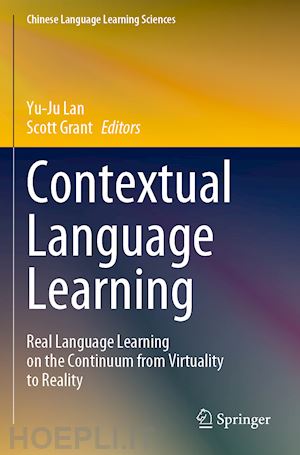Yu-Ju Lan is a Professor in the Department of Chinese as a Second Language at National Taiwan Normal University. Before becoming a professor at the university, she had been teaching in two different elementary schools in Taiwan for over 20 years. This experience has motivated her to develop different platforms to meet different language learners’ multiple needs. In light of enhancing language ability and addressing the importance of promoting Chinese language teaching to increase Taiwan’s global influence, she has been devoted to applying research outcomes in the field of Technology Enhanced Language Learning (TELL) to establishing benchmark theories and classroom practices since 2008. These outcomes are particularly significant in the use of 3D virtual contexts. Yu-Ju Lan has been devoted to researching 3D virtual reality (VR) since 2009. Over the last decade of her research in VR, she published over 20 journal papers about language learning in virtual worlds, mostly in SSCI journals. She has proposed the principles of designing tasks and VR contexts based on empirical evidence. As the need for using VR in learning grows, her pioneering works could provide essential insights for academia, education and industry. Because of her rich experience with academic publishing Yu-Ju Lan is currently the Editor-in-Chief of Educational Technology & Society Journal as well as on the editorial board of the esteemed journal, Language Learning & Technology.
Dr Scott Grant is a lecturer in the Chinese Studies Program at Monash University in Melbourne, Australia. After graduating with an economics degree in the early 1980s, Scott spent 10 years living, studying, and working in mainland China. Married in China in the late 80s, Scott and his spouse have prioritized the speaking of Mandarin at home for the last three decades. As a result, their two daughters who have grown up in Australia (although one was born in China and both visit China regularly) both speak fluent Mandarin. Combined with his own experiences over the decades as a foreign learner and user of Mandarin in work and daily life, this has given Scott unique insights into the learning of Chinese as a Foreign Language. During more than 20 years of teaching Chinese language and culture at tertiary level, Scott has jointly published over twenty papers and chapters related to learning in 3D virtual environments. He is also the creator of Chinese Island, an approach to learning and practicing Chinese language and culture that utilizes a simulated Chinese township with multiple venues & scenarios in a 3D multiuser virtual environment in combination with a conventional LMS to provide task-based and situated learning opportunities for learners of Chinese in tertiary foreign language classrooms. As part of this highly interactive learning environment, Scott has also developed a series of programmed AI virtual characters that interact with learners both conversationally and transactionally as students complete the set tasks. Scott’s current research interests include the use of immersive VR, AI and speech recognition for foreign language learning.











